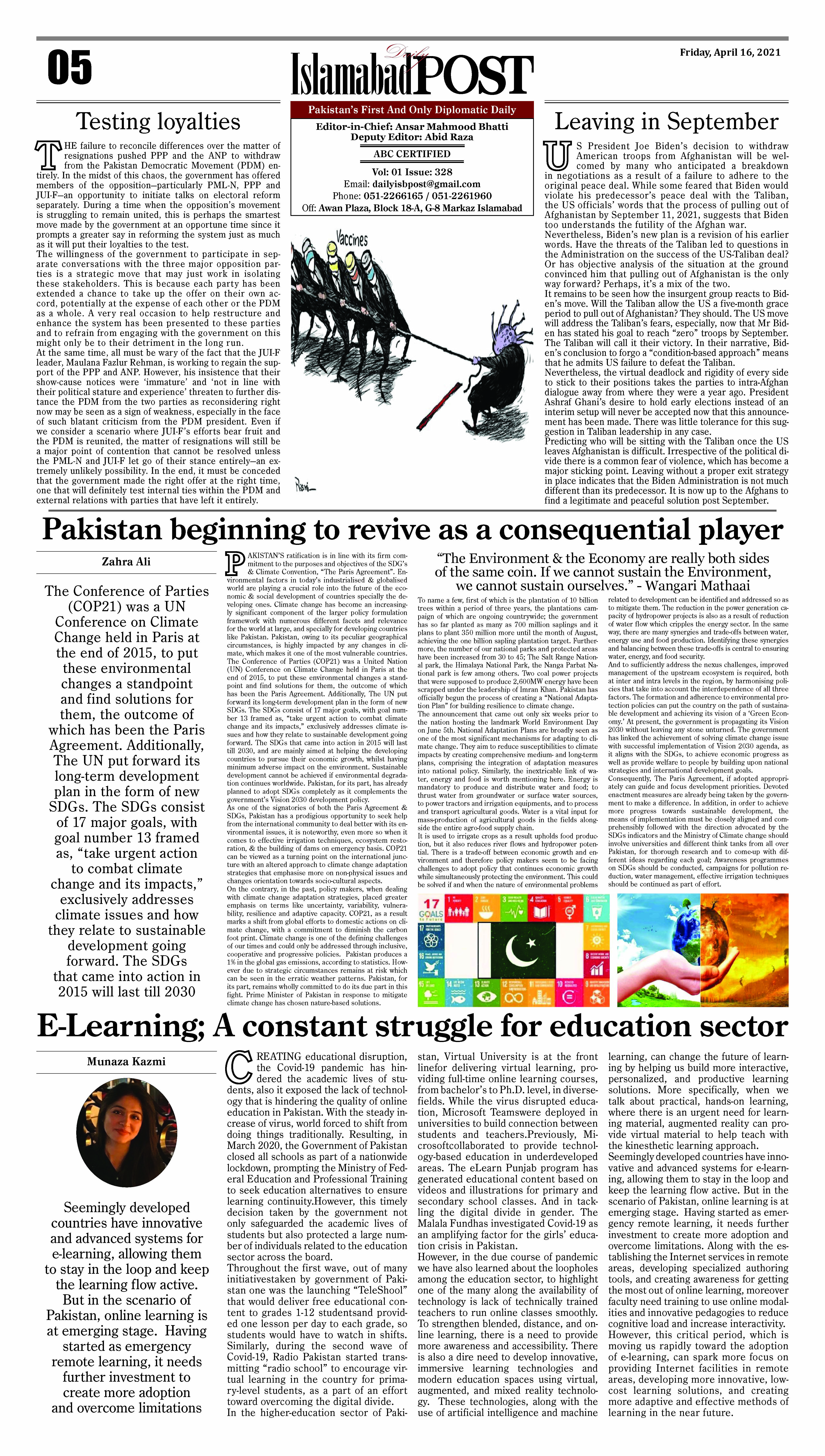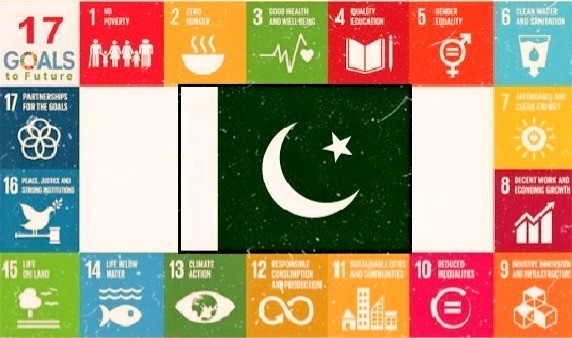“The Environment & the Economy are really both sides of the same coin. If we cannot sustain the Environment, we cannot sustain ourselves.”
-WangariMathaai
By: Zahra Ali
Pakistan’s ratification is in line with its firm commitment to the purposes and objectives of the SDG’s & Climate Convention, “The Paris Agreement”. Environmental factors in today’s industrialised&globalised world are playing a crucial role into the future of the economic & social development of countries specially the developing ones. Climate change has become an increasingly significant component of the larger policy formulation framework with numerous different facets and relevance for the world at large, and specially for developing countries like Pakistan. Pakistan, owing to its peculiar geographical circumstances, is highly impacted by any changes in climate, which makes it one of the most vulnerable countries. The Conference of Parties (COP21) was a United Nation (UN) Conference on Climate Change held in Paris at the end of 2015, to put these environmental changes a standpoint and find solutions for them, the outcome of which has been the Paris Agreement.

Additionally, The UN put forward its long-term development plan in the form of new SDGs. The SDGs consist of 17 major goals, with goal number 13 framed as, “take urgent action to combat climate change and its impacts,” exclusively addresses climate issues and how they relate to sustainable development going forward. The SDGs that came into action in 2015 will last till 2030, and are mainly aimed at helping the developing countries to pursue their economic growth, whilst having minimum adverse impact on the environment. Sustainable development cannot be achieved if environmental degradation continues worldwide. Pakistan, for its part, has already planned to adopt SDGs completely as it complements the government’s Vision 2030 development policy. As one of the signatories of both the Paris Agreement & SDGs, Pakistan has a prodigious opportunity to seek help from the international community to deal better with its environmental issues, it is noteworthy, even more so when it comes to effective irrigation techniques, ecosystem restoration, & the building of dams on emergency basis.
COP21 can be viewed as a turning point on the international juncture with an altered approach to climate change adaptation strategies that emphasise more on non-physical issues and changes orientation towards socio-cultural aspects. On the contrary, in the past, policy makers, when dealing with climate change adaptation strategies, placed greater emphasis on terms like uncertainty, variability, vulnerability, resilience and adaptive capacity. COP21, as a result marks a shift from global efforts to domestic actions on climate change, with a commitment to diminish the carbon foot print.Climate change is one of the defining challenges of our times and could only be addressed through inclusive, cooperative and progressive policies. Pakistan produces a 1% in the global gas emissions, according to statistics. However due to strategic circumstances remains at risk which can be seen in the erratic weather patterns. Pakistan, for its part, remains wholly committed to do its due part in this fight. Prime Minister of Pakistan in response to mitigate climate change has chosen nature-based solutions.
To name a few, first of which is the plantation of 10 billion trees within a period of three years, the plantations campaign of which are ongoing countrywide; the government has so far planted as many as 700 million saplings and it plans to plant 350 million more until the month of August, achieving the one billion sapling plantation target. Furthermore, the number of our national parks and protected areas have been increased from 30 to 45; The Salt Range National park, the Himalaya National Park, the Nanga Parbat National park is few among others. Two coal power projects that were supposed to produce 2,600MW energy have been scrapped under the leadership of Imran Khan.
Pakistan has officially begun the process of creating a “National Adaptation Plan” for building resilience to climate change. The announcement that came out only six weeks prior to the nation hosting the landmark World Environment Day on June 5th.National Adaptation Plans are broadly seen as one of the most significant mechanisms for adapting to climate change. They aim to reduce susceptibilities to climate impacts by creating comprehensive medium- and long-term plans, comprising the integration of adaptation measures into national policy.
Similarly, the inextricable link of water, energy and food is worth mentioning here. Energy is mandatory to produce and distribute water and food; to thrust water from groundwater or surface water sources, to power tractors and irrigation equipments, and to process and transport agricultural goods. Water is a vital input for mass-production of agricultural goods in the fields alongside the entire agro-food supply chain. It is used to irrigate crops as a result upholds food production, but it also reduces river flows and hydropower potential. There is a trade-off between economic growth and environment and therefore policy makers seem to be facing challenges to adopt policy that continues economic growth while simultaneously protecting the environment. This could be solved if and when the nature of environmental problems related to development can be identified and addressed so as to mitigate them. The reduction in the power generation capacity of hydropower projects is also as a result of reduction of water flow which cripples the energy sector.
In the same way, there are many synergies and trade-offs between water, energy use and food production. Identifying these synergies and balancing between these trade-offs is central to ensuring water, energy, and food security. And to sufficiently address the nexus challenges, improved management of the upstream ecosystem is required, both at inter and intra levels in the region, by harmonising policies that take into account the interdependence of all three factors. The formation and adherence to environmental protection policies can put the country on the path of sustainable development and achieving its vision of a ‘Green Economy.’
At present, the government is propagating its Vision 2030 without leaving any stone unturned. The government has linked the achievement of solving climate change issue with successful implementation of Vision 2030 agenda, as it aligns with the SDGs, to achieve economic progress as well as provide welfare to people by building upon national strategies and international development goals. Consequently, The Paris Agreement, if adopted appropriately can guide and focus development priorities. Devoted enactment measures are already being taken by the government to make a difference. In addition, in order to achieve more progress towards sustainable development, the means of implementation must be closely aligned and comprehensibly followed with the direction advocated by the SDGs indicators and the Ministry of Climate change should involve universities and different think tanks from all over Pakistan, for thorough research and to come-up with different ideas regarding each goal; Awareness programmes on SDGs should be conducted, campaigns for pollution reduction, water management, effective irrigation techniques should be continued as part of effort.

















